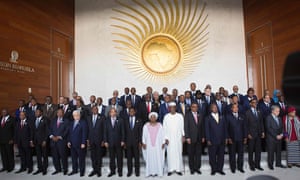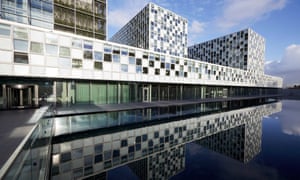Morocco rejoins African Union after more than 30 years
The country left the Union in 1984 after a row over the status of Western Sahara. Morocco’s readmission brings hope of peace-building over the territory

African heads of state before the start of the 28th African Union summit in Addis Ababa. Photograph: Zacharias Abubeker/AFP/Getty Images
Global development is supported by
 About this content
Shares
About this content
Shares
53
Ben Quinn and agencies
@BenQuinn75
Tuesday 31 January 2017 14.47 GMTLast modified on Tuesday 31 January 2017 15.03 GMT
Morocco has been readmitted to the African Union more than three decades after it left when the continental body recognised the independence of the disputed territory of
Western Sahara. Hopes that the move could pave the way for peace-building were bolstered after Western Sahara – regarded by Morocco as part of its historic territory – welcomed the readmission.
Morocco’s King Mohammed VI, who had been campaigning since last year to join the bloc, told African leaders at the AU summit in Addis Ababa: “Africa is my home, and I am coming back home.”
The foreign minister of
Western Sahara (officially the Sahrawi Arab Democratic Republic), Mohamed Salem Ould Salek, said on Monday that Morocco’s readmission was a “positive step for the people of Western Sahara”.
A former Spanish colony, Western Sahara was
annexed by Morocco in 1975 and was the focus of conflict between Morocco and indigenous people led by the Polisario Front until a UN-brokered truce brought the armed insurgency to a halt in 1991.
A UN-supervised referendum on independence was supposed to be held in 1992 but was aborted when
Morocco objected to the proposed electoral register, which it said was biased in favour of secession. A UN peacekeeping mission that attempted to organise the vote has remained in the territory ever since, monitoring the 2,700km-long sand wall built by the Moroccan army across the desert that separates the two sides.
Thirty-nine countries supported Morocco’s bid for readmission into the AU this week but nine voted against it, according to sources quoted by the Associated Press. The nine “were countries in southern
Africa, except Swaziland”, said the source, who added that most of the debate was related to Western Sahara’s border.
Morocco, the only country in Africa that was not a member of the AU, left its predecessor, the Organisation of African Unity, in 1984 after a majority of the member states recognised the disputed territory of Western Sahara.
Chad’s foreign minister was
elected on Monday as the new chairman of the African Union Commission, pledging to place development and security at the top of his agenda and streamline the organisation’s bureaucracy. Moussa Faki Mahamat – a former prime minister who has been at the forefront of the fight against Islamist militants in Nigeria, Mali and the Sahel – was chosen at the summit in Addis Ababa.






About this content

